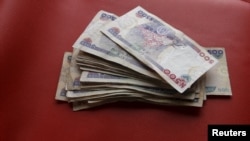For months, President Muhammadu Buhari opposed devaluing Nigeria’s currency, saying he wouldn’t support having the naira “killed.”
That stance shifted Monday, when the central bank floated the currency. It promptly lost 30 percent of its value against the dollar, but the move may have saved Nigeria’s oil-dependent economy, which is poised for a recession.
Keeping the naira strong had drained the country’s foreign reserves and scared off investors, economists say. Militant attacks on Nigeria’s vital oil infrastructure and the lingering effects of gasoline and foreign exchange shortages have undermined Africa’s largest economy, making a devaluation inevitable.
Yvonne Mhango, sub-Saharan Africa economist at Renaissance Capital, said the devaluation will help the country recover more quickly from the coming slump.
“It allows for the pain to come off quicker and for recovery to come through sooner,” said Mhango. She estimates the economy will be in recession for at least 12 months.
Oil is Nigeria’s top export, and the economy was battered by the global drop in the price to $50 per barrel from around $100 two years ago.
Attempt to boost local business
Unlike other major oil exporters such as Angola and Russia, Nigeria decided not to devalue its currency. The central bank has held it at about 200 naira to the dollar for more than a year.
Buhari said past devaluations had harmed local industries.
The president, elected last year on a pledge to diversify the economy and fight Nigeria’s deep-rooted corruption, at one point analogized a devaluation to murder.
As oil sales lost value and fewer and fewer dollars flowed into Nigeria, his administration restricted the availability of foreign currencies in a bid to keep the naira strong and preserve foreign reserves.
The strategy backfired.
From rice to radios, Nigeria’s stores are stocked with imported goods. Gasoline, too, is imported, because even though Nigeria is Africa’s top oil producer, its refineries can’t make enough fuel to satisfy demand.
Importers needed to pay wholesalers overseas, but they couldn’t get foreign currencies at the official rate. So they turned to the expensive black market for dollars, passing on the extra cost to consumers.
In the case of fuel, some importers stopped bringing shipments in entirely. For months, gasoline was scarce across Nigeria, and the situation only improved when the state oil company raised prices.
It all took its toll. Inflation reached 15.6 percent in May.
Militant attacks costly
Nigeria’s economy was further harmed by attacks on its vital oil infrastructure by a group calling itself the Niger Delta Avengers. The militants targeted pipelines in the oil-producing Niger Delta, cutting production by half, if not more.
It was all too much for Nigeria’s economy to bear. Buhari shifted course last week, saying in a newspaper op-ed that the central bank would adopt a more flexible foreign exchange policy. He called the regime “a downpayment on our people’s ability to succeed.”
Mhango said Nigeria had few options as its foreign reserves dwindled and the militant attacks stung.
“They’re running out of the firepower, which is the reserves, and secondly, something that they didn’t anticipate, or no one did, was how much oil production would fall,” Mhango said.
The pain, however, may not be over.
Mhango said the currency’s devaluation means inflation will likely increase in the short term, affecting the price of food and eroding the public’s purchasing power. It’s up to the central bank to mitigate that.
“What I’d anticipate or expect are bold rate hikes, which is typically what happens when a currency devalues by such a substantial amount,” Mhango said.
The naira was trading at about 260 to the dollar late Monday.




